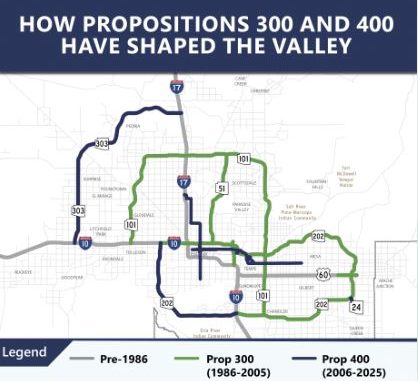
This legislative session has been marked by many important discussions on everything from local zoning, to housing solutions, to water and transportation.
For those of us who live and work in Maricopa County one transportation issue in particular has been rather difficult – the extension of Prop 400.
Prop 400 expires in 2025. That voter approved proposition provided a half cent sales tax to be used for highway, freeway, major arterial roadways and public transit throughout Maricopa County.
You see the results of Prop 400, and its predecessor Prop 300, every day. The Loop 101, the Loop 303, and the Loop 202 are some of the largest examples. There were improvements to I-10 and expansions of major roadways and to public transit in that funding too.
You might recall in 2022 Governor Ducey vetoed the Prop 400 extension bill. While some were quite critical of the veto, others favored it. One of the controversial elements was the amount of Prop 400 extension money allocated toward public transit and particularly light rail, about 40%.
Since last year, MAG (Maricopa Association of Governments), cities, towns and legislators have worked to create a bill with more widespread support. Right now, it looks like SB 1102 or something similar will have the best chance. Last week I was in a meeting at which Mayor Kenn Weise, who is heading the MAG Prop 400 extension efforts, mentioned the ability for a Prop 400 extension to get out of the legislature is by no means certain.
Some may wonder why this is so important and why people are anxious now, since the tax doesn’t expire until 2025.
The answer is planning and the ability to receive federal matching funds for planned projects. With the extension of the tax in question, some planned projects like the SR-30, have been slowed or stopped. Transportation infrastructure planning is slowing since without certainty, no one wants to extend moneys that may not bring a completed project.
Planning major projects, acquiring the rights of way, and building these large projects takes years.
What is most confounding is that Maricopa County is the only county in Arizona that must have their transportation funding passed by the state legislature and signed by the Governor in order to qualify for the ballot.
That means if the legislative session ends with no approved bill signed by the Governor, Maricopa County voters won’t get a chance to vote on transportation funding for at least another year. Which means additional freeway and highway projects delayed.
You can read SB 1102 to find out more information on the current proposed plan and funding allocations. You will also want to visit the MOMENTUM page of MAG’s website where you will find the transportation plan looking out to 2050.
There are many consequences to residents, business, and economic development if some kind of transportation plan and funding mechanism doesn’t come to fruition soon. Read the plan and the current bill. Ask questions of your City Council and Mayor. Find out how you and your clients may be impacted, and then let your state legislators and the Governor know your thoughts.
Since roadways and freeways are important to the real estate industry and our clients, you might wish to provide your thoughts to the Arizona Association of REALTORS® so they can better understand the concerns of residents and business as they participate in discussions down at the Capitol.
